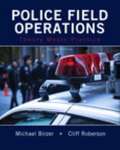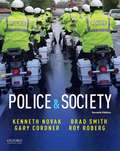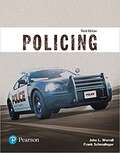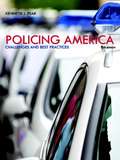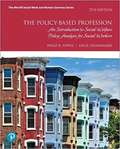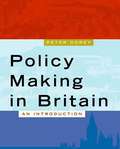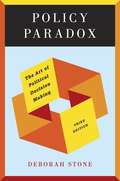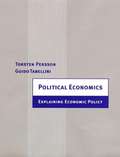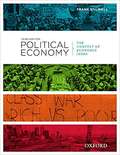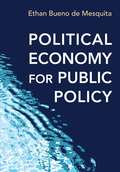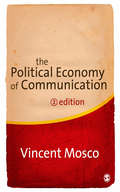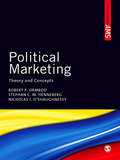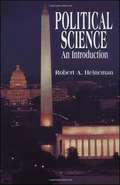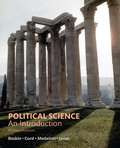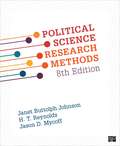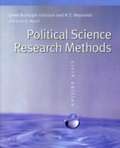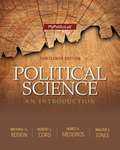- Table View
- List View
Police Field Operations: Theory Meets Practice
by Cliff Roberson Michael L. BirzerPolice Field Operations: Theory Meets Practice, 2/e is a comprehensive, readable text that presents a practical look at police field operations and is designed to be used in one-semester courses on police operations or patrol procedures. Chapters have been designed to be independent units that can be taught individually, but also build upon each other to provide a complete picture of police operations. The text cover all major areas of police operations including patrolling, investigations, crime mapping, community policing, hot pursuit issues, communications, gangs and drugs, and more. Discussions focus on issues and challenges that police officers face on the job and help students bridge the gap between theory and practice.
Police & Society
by Kenneth Novak Gary Cordner Bradley Smith Roy RobergFocusing on the relationship between the police and the community and how it has changed throughout the years, the authors explore the most important theoretical foundations and incisive research on contemporary policing and show how that research is put into practice.
Policing
by John L. Worrall Frank J. SchmallegerRevel Policing, Third Edition, provides an affordable, thought-provoking look at policing that uses clear writing and eye-catching visuals to get your students straight to the important concepts. <p><p> By focusing on these core concepts, students will gain true understanding of the material, without becoming overwhelmed with unnecessary information. <p><p> The book's conversation-starting pedagogy encourages active participation in learning, moving students beyond memorization by engaging them in the latest research findings and current events shaping the field.
Policing America: Challenges and Best Practices (Eighth Edition)
by Kenneth J. PeakPolicing America: Challenges and Best Practices, 8e, offers a problem-solving approach that emphasizes what is actually working in the field. Based on the author’s thirty-plus years of practical policing and academic experience, this eighth edition continues to be set apart by its traditional, applied, “what works” theme. That, coupled with comprehensive updates throughout and the minor restructuring of this edition, provide an approach not otherwise found on the market. Emphases are on topics of major, national importance and interest, such as terrorism, personnel issues, community policing, investigations, rule of law, accountability (ethics, liability), patrol, and technologies. Organized to flow smoothly for the instructor and student, this edition continues to provide a penetrating view of one of the most difficult and challenging occupations in America: policing!
The Policy-based Profession: An Introduction to Social Welfare Policy Analysis for Social Workers
by Leslie Leighninger Philip PoppleHelp students connect social policy to the everyday practice of social work<P><P> The Policy-Based Profession provides students with a process for analyzing policies that will help them with their careers in social work. It offers a detailed foundation for policy analysis, including chapters on historical, economic, and social policy analysis. Students then learn to apply the analysis framework to representative policies and issues in the fields of public welfare, aging, mental health, substance abuse, health, child welfare, and immigration. <P><P> Correlated with the most recent Council on Social Work Education (CSWE) Competencies, the 7th Edition includes the most recent research, theories, and political developments impacting the field. An entirely new chapter on immigration policy highlights this critical social justice issue, the health chapter delves into recent happenings in health care reform, and the mental health chapter includes material on the opioid epidemic and returning veterans. <P><P> Also available with the Enhanced Pearson eText The Enhanced Pearson eText provides a rich, interactive learning environment designed to improve student mastery of content with check your understanding quizzes and end-of-chapter reviews.
Policy Making in Britain: An Introduction
by Peter Dorey'By applying the range of tools of policy analysis to the detail of the policy making machinery of British government, Peter Dorey's text has met a need for teachers and students of these subjects which has not been fulfilled for a decade or more. I have adopted it straight away as a 'must buy' for my own students' - Justin Greenwood, Robert Gordon University 'A very welcome addition to the literature on public policy-making in contemporary Britain and ideal for teaching purposes. Peter Dorey's new book is clearly written, theoretically informed, but also rich in illustration. A key resource for all students of British public policy' - Dr Andrew Denham, Reader in Government, University of Nottingham This accessible textbook introduces students to the public policy-making process in Britain today. Assuming no prior knowledge, it provides a full review of the key actors, institutions and processes by addressing the following questions: who sets the public policy agenda? who influences the detail of public policy? what makes for successful implementation of public policy? is there such a thing as 'British' public policy? Peter Dorey is careful to ground theory in the reality of contemporary British politics and the text fully assesses the impact of devolution and European integration and the evolution from government to governance. The result is a lively and accessible new text that will be required reading for all students of contemporary British politics, public policy and governance.
Policy Paradox: The Art of Political Decision Making (Third Edition)
by Deborah StoneThe most accessible policy text available. Policy making is a political struggle over values and ideas. By exposing the paradoxes that underlie even seemingly straightforward policy decisions, Policy Paradox shows students that politics cannot be cleansed from the process in favor of "rationality. " Author Deborah Stone has fully revised and updated this popular text, which now includes many paradoxes that have arisen since September 11. Examples throughout the book have been updated, and the prose has been streamlined to make a great read even better.
Political Economics: Explaining Economic Policy
by Torsten Persson Guido Enrico TabelliniWhat determines the size and form of redistributive programs, the extent and type of public goods provision, the burden of taxation across alternative tax bases, the size of government deficits, and the stance of monetary policy during the course of business and electoral cycles? A large and rapidly growing literature in political economics attempts to answer these questions. But so far there is little consensus on the answers and disagreement on the appropriate mode of analysis. Combining the best of three separate traditions--the theory of macroeconomic policy, public choice, and rational choice in political science--Torsten Persson and Guido Tabellini suggest a unified approach to the field. As in modern macroeconomics, individual citizens behave rationally, their preferences over economic outcomes inducing preferences over policy. As in public choice, the delegation of policy decisions to elected representatives may give rise to agency problems between voters and politicians. And, as in rational choice, political institutions shape the procedures for setting policy and electing politicians. The authors outline a common method of analysis, establish several new results, and identify the main outstanding problems.
Political Economy: The Contest Of Economic Ideas
by Frank StilwellNow in its third edition, Political Economy: The Contest of Economic Ideas is a fully updated survey of the political economy and its connection with social concerns. Moving beyond conventional treatments, this unique text offers a "big-picture" overview of the analytical tools and value judgments associated with competing schools of economic thought. Featuring an exceptionally engaging writing style, this text makes the complexities of contesting economic ideas--including classical political economy and Marxist economics and neoclassical economies and neo-liberalism--clear and accessible to students. The third edition includes a new chapter on the economics of happiness and new sections on current issues like the global financial crisis, climate change, and "affluenza."
Political Economy for Public Policy
by Ethan Bueno de Mesquita<p>This textbook uses modern political economy to introduce students of political science, government, economics, and public policy to the politics of the policymaking process. The book's distinct political economy approach has two virtues. By developing general principles for thinking about policymaking, it can be applied across a range of issue areas. It also unifies the policy curriculum, offering coherence to standard methods for teaching economics and statistics, and drawing connections between fields. <p>The book begins by exploring the normative foundations of policymaking―political theory, social choice theory, and the Paretian and utilitarian underpinnings of policy analysis. It then introduces game theoretic models of social dilemmas―externalities, coordination problems, and commitment problems―that create opportunities for policy to improve social welfare. Finally, it shows how the political process creates technological and incentive constraints on government that shape policy outcomes. Throughout, concepts and models are illustrated and reinforced with discussions of empirical evidence and case studies. <p>This textbook is essential for all students of public policy and for anyone interested in the most current methods influencing policymaking today. <p> <li>Comprehensive approach to politics and policy suitable for advanced undergraduates and graduate students <li>Models unify policy curriculum through methodological coherence <li>Exercises at the end of every chapter <li>Self-contained appendices cover necessary game theory <li>Extensive discussion of cases and applications</li> </p>
The Political Economy of Communication: Rethinking And Renewal (Media, Culture And Society Ser.)
by Vincent Mosco"A masterpiece... the one single indispensable book that all media students and scholars need to read to understand this vital and growing area of research." - Robert W. McChesney, University of Illinois at Urbana-Champaign "A contemporary classic of media studies. Vincent Mosco, among the leading media scholars of our or any time, brings his searing insights and crystal prose to bear on the latest issues and debates of the field... An indispensable resource for researchers, activists, and students everywhere." - Toby Miller, University of California, Riverside Since publication of its first edition, The Political Economy of Communication has established itself as a true classic and one of the most important contributions to the field. This second edition has been thoroughly restructured, updated and expanded to make it an indispensable text for students and scholars alike. Putting the student at the centre of its updates, this book: Maps the definitions and foundations of political economy Adds 3 new chapters to explore current trends, from feminism and labour to new media, forms of resistance, media reform and democracy Illustrates throughout how power operates across the 21st century media landscape Explores key issues in how media power intersects with globalization, social class, race, gender and surveillance Shows media students why it is essential to understand political economy and its application to media and communication. Combining penetrating theoretical analysis with passionate commitment, Vincent Mosco once again gives readers an indispensable introduction to the field.
Political Marketing: Theory and Concepts (SAGE Advanced Marketing Series)
by Stephan C Henneberg Robert P. Ormrod Nicholas O'ShaughnessyPolitical Marketing: Theories and Concepts provides students with a valuable and critical understanding of how political parties use marketing to attain their aims. Unlike other textbooks, this text explicitly focuses on the theoretical underpinnings and cutting edge concepts used by political parties, allowing students to gain key insights into how they win elections and remain in power. With an engaging and thought provoking topic selection, these field-leading authors have ensured that this often complex and theoretically advanced topic is clearly accessible for a student audience and novice researchers.<P> Key features of each chapter include:<P> - Short chapter introduction and learning summaries<P> - Discussion questions to share in the classroom<P> - Annotated suggestions for further reading<P> - Lists of key terms to consider<P> This text is essential reading for advanced undergraduate and postgraduate students on political marketing courses.<P> Dr Robert P. Ormrod, University of Aarhus, Denmark<P> Dr Stephan C. Henneberg, University of Manchester<P> Professor Nicholas J. O'Shaughnessy, Queen Mary, University of London
Political Science: An Introduction
by Robert A. HeinemanIntroductory college textbook on political science
Political Science 11th Standard - Tamilnadu Board
by State Council of Educational Research TrainingPolitical Science Textbook for the 11th Standard Students, preparing for Tamil Nadu State Board Exam.
Political Science 12th Standard - Tamilnadu Board
by State Council of Educational Research TrainingPolitical Science Textbook for the 12th Standard Students, preparing for Tamil Nadu State Board Exam.
Political Science 317 NIOS
by National Institute Of Open SchoolingPolitical Science textbook for Senior Seccondary level NIOS.
Political Science class 10 - JK Board: Democratic Politics Part 2
by The Jammu and Kashmir State Board of School EducationThe present Textbook has been developed in the light of NCF - 2005 guidelines. The Textbook developed on the basis of NCF signifies an attempt to discourage rote learning. The attempt has also been made to link children's life at school and life outside the school. This Textbook of Social Science aims at enabling students to develop critical understanding of society to lay foundation for an analytical and creative mindset relating to political developments. Change in the text book entails the change in the content and pedagogical practice of curriculum. Main objective of this change is to enable the children to understand the society and the world in which we live, as well as, to comprehend socio - political advancements.
Political Science class 11 - GSTB
by Gujarat State Board of School TextbooksThe board expresses the pleasure to publish the Textbook of Political Science for Std. 11 which is a translated version of Gujarati language.
Political Science class 11 - Tamil Nadu Board: அரசியல் அறிவியல் மேல்நிலை முதலாம் ஆண்டு
by State Council of Educational Research and Training Tamil Naduஇந்த புத்தகத்தில் நாம் அரசியல் அறிவியலின் அறிமுகம், அரசு, அரசியல் அறிவியலின் அடிப்படைக் கருத்தாக்கங்கள், மக்களாட்சி, அரசாங்கத்தின் வகைப்பாடுகள், அரசியல் சிந்தனை, அரசியல் கொள்கைகள், சமூக நீதி மற்றும் சில பாடங்கள் பற்றி காண்கிறோம்.
Political Science class 9 - JK Board: Democratic Politics Part 1
by The Jammu and Kashmir State Board of School EducationThe present Textbook has been developed in the light of NCF-2005 guidelines. The Textbook developed on the basis of NCF signifies an attempt to discourage rote learning. The attempt has also been made to link children's life at school and life outside the school. This Textbook of Social Science aims at enabling students to develop critical understanding of society to lay foundation for an analytical and creative mindset relating to political developments. Change in the text book entails the change in the content and pedagogical practice of curriculum. Main objective of this change is to enable the children to understand the society and the world in which we live, as well as, to comprehend socio-political advancements.
Political Science (Fourteenth Edition): An Introduction
by Michael G. Roskin Robert L. Cord James A. Medeiros Walter S. JonesPolitical Science: An Introduction shows readers how the fundamental tenets of political science have helped important leaders make critical decisions for centuries. The authors present a balance of theoretical abstractions and applied reasoning to help readers understand how to make calm, rational choices when it comes to political manipulation. <p><p> The Fourteenth Edition asks readers to explore the controversial topic of exported democracy, and whether certain countries are ready and equipped to apply our form of government. By examining issues such as the Iraq war and the difficulty of adapting our own democracy in the U.S., the text prompts readers to form their own opinions about democracy and political science. Geared toward those learning about the topic for the first time, the authors encourage readers to consider different paradigms, viewpoints, and theories when developing their own political views.
Political Science - Higher Secondary First Year - Tamil Nadu Board - SCERT
by Government Of Tamil NaduPolitical Science is like the skill set of a swimmer. The person with swimming skills can swim in any water body whether it is a pond or a lake or an ocean. A political science student with apt knowledge, attitude and skills can join any career of general nature.
Political Science Research Methods
by Janet Buttolph Johnson Jason D. MycoffThe Eighth Edition of this trusted resource offers a greater emphasis on the ways in which particular methods are used by undergraduates, expanded coverage of the role of the Internet in research and analysis, and more international examples.
Political Science Research Methods, 6th Ed.
by Janet Buttolph Johnson H. T. Reynolds Jason D. MycoffDon't let an introduction to research methods be your students' least favorite (and most intimidating) political science course. Relevant, timely, insightful, comprehensive, and always mindful of their student audience, the authors have revamped their popular text so that the sixth edition is friendlier and more intuitive than ever--the perfect gateway to understanding not just the "how" but also the "why" behind research into politics. Covering the discipline's major methods, the authors lead students step-by-step through the logic of research design. "Building block" chapters on hypothesis formation and testing, variables, and measurement are right up front; the introduction to research design, sampling, and literature reviews now come with more explanation as to why a researcher would pursue different kinds of methods; the stats chapters begin with a common-sense primer that walks students through foundational ideas and practices. Throughout the text, updated examples of contemporary research problems keep readers engaged. Each chapter has bolded key terms that are also listed in a glossary at the end of each chapter and the end of the text. "Helpful hints" feature boxes give students nuts-and-bolts reminders they can refer to when they conduct their own research or assess the work of others. NEW TO THIS EDITION New examples of political science research in Chapter 1, including a case on judicial decision making and current research into public opinion on the war in Iraq. Expanded discussion of theory in Chapter 2, showing how competing paradigms can be applied to the same topic of study. Substantially updated discussion of survey research including coverage of Internet polling and a fuller description of interviewing. Computational formulas and calculations are now featured in "How It's Done" boxes allowing students to separate lengthy calculations from substantive discussion of the meaning or interpretation of statistical results. Greater coverage of newer developments in applied statistics, including exploratory data analysis and descriptive and inferential statistics for counts and functions of counts. In general, less emphasis on computation, and more on interpretation. Reorganized statistics chapters for better comprehension with regression analysis and logistic regression in their own chapters. A new overview of statistical analysis, including discussion of data preparation, description, modeling, inference, interpretation, and the communication of results.
Political Science (Thirteenth Edition): An Introduction
by Michael G. Roskin Robert L. Cord James A. Medeiros Walter S. JonesPolitical Science: An Introduction, 13/e, provides a comprehensive and jargon-free introduction to the field’s basic concepts and themes. It draws examples from the U.S. and other countries to introduce the entire field of political science to new readers. The authors stress how exciting politics can be, balancing practical and theoretical knowledge.
